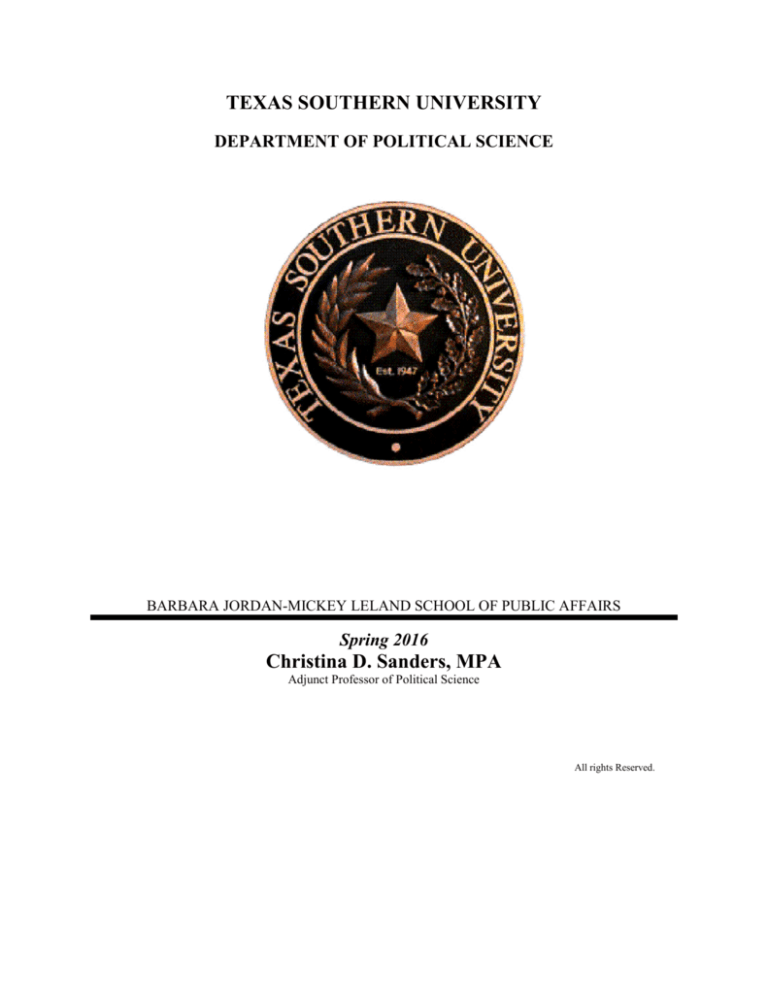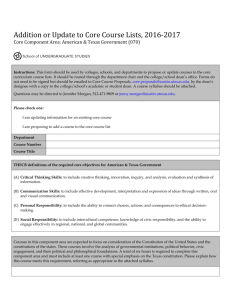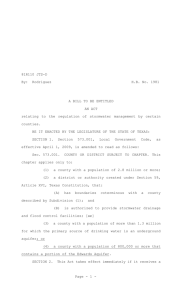
TEXAS SOUTHERN UNIVERSITY
DEPARTMENT OF POLITICAL SCIENCE
BARBARA JORDAN-MICKEY LELAND SCHOOL OF PUBLIC AFFAIRS
Spring 2016
Christina D. Sanders, MPA
Adjunct Professor of Political Science
All rights Reserved.
Course Outline
Political Science 236 – Texas Government
TCCN – Government 2306 – Texas Government (Texas constitution and topics)
Course Description:
Origin and development of the Texas Constitution, structure, and powers of state and local government,
federalism, and inter-governmental relations, political participation, the election process, public policy, and
the political culture of Texas.
Semester Credit Hours: 3
Required Core Objectives:
Critical Thinking Skills – to increase creative thinking, innovation, inquiry and
analysis, evaluation and synthesis of information
Communication Skills – to include effective development, interpretation and
expression of ideas through written, oral, and visual communication
Personal Responsibility – to include the ability to connect choices, actions, and
consequences to ethical decision making
Social Responsibility – to include intercultural competence, knowledge of civic
responsibility, and the ability to engage effectively in regional, national, and
global communities
Learning Outcomes:
Upon successful completion of this course, students will:
1. Explain the origin and development of the Texas constitution.
2. Describe state and local political systems and their relationship with the federal
government.
3. Describe separation of powers and checks and balances in both theory and
practice in Texas.
4. Demonstrate knowledge of the legislative, executive, and judicial branches of
Texas government.
5. Evaluate the role of public opinion, interest groups, and political parties in Texas.
6. Analyze the state and local election process.
7. Identify the rights and responsibilities of citizens.
8. Analyze issues, policies, and political culture of Texas.
Topics:
1. Introduction: Overview
Learning Outcome 8 with emphasis on political cultures of Texas
2. Constitution Foundations: Federalism and the Texas Constitution
Learning Outcomes 1, 2, with emphasis on Federal government and 3
3. Local Governments: Municipal Governments
1
Learning Outcome 2
4. Local Governments: Counties, Special Districts and Metropolitan Areas
Learning Outcome 2
5. Campaigns and Elections
Learning Outcomes 5, 6, 7, and 8
6. Interest Groups
Learning Outcomes 5 with emphasis on interest groups, 6, and 8
7. Political Parties
Learning Outcomes 5 with emphasis on political parties, 6, and 8
8. The Legislature
Learning Outcomes 2, 3, 4, with emphasis on the legislative branch, 5 and 8
9. The Executive: Powers
Learning Outcomes 2, 3, 4, with emphasis on the executive branch, 5 and 8
10. The Executive: Plural Executive
Learning Outcomes 2, 3, 4, with emphasis on the executive branch, 5 and 8
11. Bureaucracy: Public Policy and Administration
Learning Outcomes 2, 4, with emphasis on the executive branch and 8 with
emphasis on issues and policies
12. The Judiciary: Laws and Courts
Learning Outcomes 2, 3, 4, with emphasis on the judicial branch, 5 with emphasis
on interest groups and political parties and 8
13. The Judiciary: Corrections
Learning Outcomes 2, 3, 4, with emphasis on the judicial branch, 5 with emphasis
on interest groups and 8
14. Economics
Learning Outcomes 2 and 8
15. Conclusions
Learning Outcomes 1-8; Review and assess progress
2
Required Core Objectives
Exercises
The professor will inform students whether written, visual, oral communications or some combination of
the three will be used to meet the core objectives requirement. The professor will also develop exercises
consistent with relevant eras, events, and projections for the future or some combination of the three.
Sample Exercises:
Critical Thinking Skills – to increase creative thinking, innovation, inquiry
and analysis, evaluation and synthesis of information
Keeping the concept of federalism, the historical evolution of constitutional
government in Texas, and political culture in mind develop a new constitution for
the state of Texas.
Communication Skills – to include effective development, interpretation and
expression of ideas through written, oral, and visual communication
Select an issue of importance to students in Texas and development an interest
group. Develop an organizational structure, membership recruitment and retention
plan, revenue stream, and theoretical and practical means by which to get the
issue on the appropriate political agenda.
Personal Responsibility – to include the ability to connect choices, actions,
and consequences to ethical decision making
Assume you have landed your first job working for an elected government
official. This is your dream job for two reasons- you respect your boss and you
have political ambitions of your own. You work very hard and gain your boss’
confidence. You learn that your boss is engaged in immoral but not necessarily
illegal activities. Careers and projects of importance to constituents are at risk of
being lost if your boss’ activities are exposed. Discuss the pros and cons of
exposing your boss. Then draw a conclusion.
Social Responsibility – to include intercultural competence, knowledge of
civic responsibility, and the ability to engage effectively in regional, national,
and global communities
The American educational system is being called into question at all levels. What
would you do to improve the system?
.
3
Assessment
The professor will inform students regarding the use of examinations, written, visual, oral
communications or some combination of methods to assess the status of students in the
class.
Course assignments will consist of weekly research projects, quiz examinations,
mid-term exam, comprehensive final exam, group in-class presentation and end of
semester individual project.
In addition, each student is required to participate on 4 hours of civic engagement
activities. Civic engagement activities must be approved by professor prior to
participation in order to ensure course credit. Students may complete hours with
any political party, interest group or issue campaign.
There will be several sessions recommended by the professor for students to attend
and complete engagement hours as a unit.
MAKE-UP EXAM:
Only students with legitimate reasons for missing an exam will be allowed to take the
makeup. Students who cannot, for any reason, take an exam must notify the instructor at
least 24 hours before the scheduled examination. Make-up times will be determined by
consultation between the student and the instructor. Failure to take the final examination
will result in a failing grade in the course.
ATTENDANCE POLICY, CLASS CONDUCT, AND FORMAT:
Regular and punctual class attendance is mandatory. Excessive absences may lead to a final grade
reduction. Students are expected to come to class having read the assigned readings. Remember, in-class
participation means taking an active part during class meetings. The best way for you to develop and
sharpen your capacity to think is for you to be actively involved in class discussions. If you should miss a
class, it is your responsibility to obtain lecture notes and assignments from your classmate. Students should
avoid any form of class disturbance. Therefore, all cell phones or pagers must be on the off mode
during class meetings and failure to comply will result in a five-point penalty. Friends or visitors can
only come to class with the instructor's permission.
ACADEMIC DISHONESTY:
Students must obey the University policy on academic dishonesty. Therefore, cheating or plagiarism in
any form is unacceptable, including the presentation by one as his or her own work the work of
another student. The penalty for any type of plagiarism or cheating will be an “F” on the assignment or
exam (see the Student Code of Conduct for detailed information on academic appeals process).
WITHDRAWAL POLICY:
Should you decide to drop this course at any time, you must do so by yourself. Failure to drop a course
because of not passing or excessive absences will result in an “F” grade at the end of the semester. To
receive a grade of “W” you must drop the class by the University recommended withdrawal date.
4
ADA STATEMENT:
Texas Southern University is dedicated to providing the least restrictive learning environment for all
students. TSU promotes equal opportunities in academic access through the implementation of reasonable
accommodations as required by the Vocational Rehabilitation Act of 1973, Title V, Section 504 and the
Americans with Disabilities Act of 1990 (ADA–Public Law 101-336) which will enable students with
disabilities to participate in and benefit from all post-secondary educational programs, courses, activities,
and services.
If you require reasonable accommodations because of a physical, mental, or learning disability, please
notify the instructor of this course as soon as possible and preferably before the end of the first two weeks
of class to arrange for reasonable accommodations or register with the Office of Student Services (Phone
713-313-7011) or the Office of Enrollment Services (Phone 713-313-7071).
5








